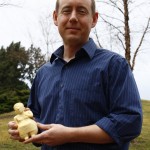
By Ben Markley
Of all the college’s off-campus locations, probably the least well-known is Proyecto Arqueologico de Otoro (PADO), a three-week archaeological field school in Honduras.
William McFarlane, chair of Anthropology and co-director of PADO, said his purpose for the project is practical.
“My goal is to offer an opportunity for students to have research experiences as early as possible in their academic career so they have that experience to build on in the classroom,” he said. “If you’re going to go on in anthropology or any social science, the sooner you have research experiences, the more valuable the classroom will become.”
Sandra Moran, field director for the 2011 PADO season, said no amount of books or classes could replace the experience.
“There is absolutely no substitution for getting out into the field and getting your hands dirty,” she said. “When you’re there, you are doing archaeology.”
McFarlane said he and his co-director Miranda Stockett were aware of the value of an archaeological field school before they started taking students in 2008.
“We both started through a field school,” he said. “We knew the value of a field school as far as getting research accomplished, but also as an educational tool.”
He said he enjoyed how the field school created a different kind of student-professor understanding.
“I think it’s one of the first times that students get to see their professors from behind the podium, as real people actually doing their work,” McFarlane said.
McFarlane has done research in Honduras through various field schools since 1998.
“[Honduras] is kind of an inventory of the entire cultural history of the country,” he said. “We’ve got stuff in our valley that’s very, very early on, probably pre-farming, all the way through the colonial period. What we have is this cross-section of the entire country that reflects dynamics of Latin American political development.”
In 2004, he began doing research projects in the valley Jesús de Otoro, where the college’s field school currently excavates.
Moran said the cultures researched there are not nearly as widely studied as other cultures.
“When [McFarlane and Stockett] were aware of this valley, they recognized that this was an area that no one was really working at,” she said. “The Maya are kind of the superstars, but there’s this rich tapestry of people who lived outside of the Maya heartland that have their own stories to tell.”
McFarlane said students applying for the field school should expect a genuine archaeological experience.
“[Students] should expect to be engaged in ongoing archaeological research,” he said. “It’s not a case study; it’s not fake. It’s real, ongoing research that [students] are going to be contributing to the cultural heritage of Honduras.”
The three weeks at the field school costs approximately $2,648, which covers airfare, tuition, housing, food and field trips, including a trip to the ancient Mayan city of Copán.
“For $2600, [students] get to spend three weeks abroad, all expenses covered, and they get eight credit hours’ worth of transfer courses,” McFarlane said. “It’s a good bargain.”
Janette Jasperson, coordinator of International Education, said that students planning to take the trip should expect culture shock.
“We have all these ways that we understand how we behave and how life works, and you go into another culture, and they have a whole different set,” she said. “That can be upsetting, and it can make you stop and evaluate yourself and your own views.”
McFarlane said the knowledge of the anthropology staff helps to ease the transition.
“We make it pretty comfortable as far as that adjustment period goes,” he said.
McFarlane, Moran and Jasperson all emphasized that students interested in going to Honduras should take time to learn about anthropology, archaeology and especially Spanish.
“Language and culture get wrapped up in each other,” Jasperson said. “If you don’t care about learning [the culture’s] language then you should probably go to a different part of the world.”
The field school is not currently looking for applicants for the June 2012 study. However, students interested in learning more about the school can contact William McFarlane at mcfar[email protected] or visit http://www.jccc.edu/anthropology/field-school/.
Contact Ben Markley, sports editor, at [email protected].





















